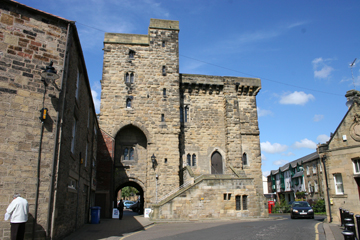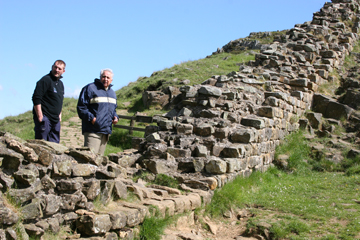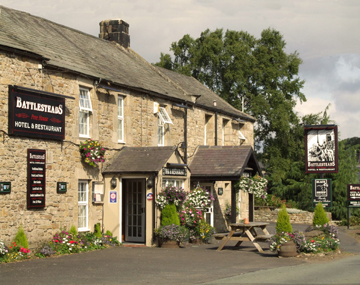A Trip into the Past—Northumberland, England
by Sandy Zimmerman, Travel Writer and WTA Member
Learn about Northumberland, England by reading
A Trip into the Past by Sandy Zimmerman, Travel Writer.
It features a mini, but thorough tour of the destination, plus all
you'll need to know to plan your trip including getting there, objective
information on places to stay and eat, and things to do. At the
end of the article, we've provided a summary of the contact information
for your easy reference. Enjoy!

The Medieval village, Hexam
Photo courtesy of Sandy Zimmerman
The unspoiled feeling of Northumberland is mixed with the thrills
of visiting castles and other ancient Roman ruins. If you want to
get away from the crowds, to be one with nature, the perfect vacation
is Northumberland, England. Northumberland has more castles on the
border than anywhere in the world. There are so many surprises when
you explore Northumberland’s 4,000 year history. Northumberland
is described as “England as it used to be.” Visitors have so much
to see in this region, especially the Dark Ages Abbey town of Hexam.
You will see crosses from the Dark Ages, eighth century and other
relics.
Alnwick Castle located in Northumberland, was built immediately
following the Norman Conquest, and has been renovated and remodeled
a number of times. It is the second largest inhabited castle in
England after Windsor Castle and is open to the public throughout
the summer. This castle was used as a stand-in for the exterior
and interior of Hogwarts in the Harry Potter films.
According to the Northumberland National Park (www.northumberlandnationalpark.org.uk),
“Hadrian’s Wall (http://hadrianswallcountry.co.uk)
is the most important structure in Britain built by the Romans,
and is the best-known frontier in the entire Roman Empire”. The
wall, which began to be built in AD 122, was built to prevent military
raids on Roman Britain from the north, to improve economic stability,
to provide peaceful conditions in Britain, and to physically mark
the frontier of the Empire. It is also thought that the gates through
the wall would have served as customs posts to allow trade taxation.
The experience means so much more when you realize that much of
Hadrian’s Wall is still intact after 2,000 years. Hadrian’s Wall
was named a World Heritage Site in 1987. In 2005, it became part
of the larger "Frontiers of the Roman Empire" World Heritage Site,
which also includes sites in Germany. The wall winds up hills and
around the bogs, running 84 miles coast-to-coast along the national
trail. Housestead’s Roman fort is located along Hadrian’s Wall and
is the most complete example of a Roman fort in Britain. Four landmark
English Heritage Sites dot the wall.
So popular is this historic attraction, the Hadrian’s Wall bus
runs daily through the summer. Daily trains are scheduled to Hexam
with bus connections. Choose from 40 walks and cycle routes of the
towns around Hadrian’s Wall and into the country (http://www.nationaltrail.co.uk/hadrians-wall-path http://www.hillwalktours.com/hiking-england/hadrians-wall-path-overview).
Places To Stay

Hadrian's Wall
Photo courtesy of Sandy Zimmerman
Close to the Scottish border and a stone’s throw from Hadrian’s
Wall, we were brought to Battlesteads Country Inn and Restaurant
for lunch. Built in 1747 as a farmhouse, the Inn was a part of the
village’s more recent history. The owner, Richard Slade recounted
stories of the Reivers, the Anglo-Scottish border raiders who robbed
cattle ranches from the 13th to the 17th century. It was a lawless
time when the people were constantly alert, watching for the raiders.
England and Scotland both had their own Reivers who robbed from
Edinburgh to Yorkshire. The frontiersmen built fortified tower houses
for defense with a large place to keep their cattle in the basement
and the house above.

Battlesteads Restaurant & Inn
Photo courtesy of Sandy Zimmerman
Battlesteads is a four-star inn with a reputation for great food
and efforts to preserve the environment. Richard installed a wood
chip-burning biomass boiler system which provides heating and water
for the entire building along with solar panels. They won the Gold
Award for Green Tourism and were named “One of the Top 20 Gourmet
Inns of the UK” (2008). For a restaurant in a small village, Battlesteads
is amazing—offering several international menus. They purchase the
freshest local ingredients from within a 50 mile radius. I especially
enjoyed their wide variety of mushrooms, some of which were over
2” long!
The last word in elegance and luxury in a classical setting,
the De Vere Slaley Hall Hotel
stands proudly as a monument to the past. The building’s embattled
wall and architecture resembles a castle. It began as a stately
mansion built by Charles Samuel Hunting, in 1912, as his family
home. They employed a housekeeper, five maids, butler, footman,
cook, two kitchen staff, seven gardeners, three chauffeurs, game
keeper, forester and family of six who ran the home farm. In 1984,
Slaley was sold and has remained unchanged throughout the years,
except for adding a wing.
At Slaley Hall, everything is orchestrated for the guest’s enjoyment
and comfort. The chef is totally committed to source the best produce
and livestock from small, local Northumberland farms which do not
use pesticides; some are organic and have the highest standards
in quality. They visit the farm to see how the animals are reared
and treated. Everything is fresh from a 30 mile radius. Slaley Hall’s
philosophy – this is the life – is what they want guests
to feel when they are there.
Duke’s Grill, in a classic Edwardian drawing room, uses a special
Josper charcoal grill with a very intense heat to seal in the flavor.
Steaks quickly retain all of their moisture and tenderness. The
waiter wheels the antique silver trolley to the table and carves
the aged sirloin roast. In contrast, the Claret Jug Restaurant is
rustic with serving chopping boards, platters, share plates and
cast iron dishes. They offer different flavors and tastes that you
do not usually find.
With 1,000 acres of forest and moorland, Slaley offers many settings
for weddings, parties and business conferences. They arrange Casino
Nights, Viking Nights, Bedouin Tents, Medieval themes and just about
everything! A bride can arrive by helicopter or she and the groom
can be whisked away by helicopter after the wedding. The grounds
sparkle with lights at night and the Northumberland pipes are played
during the event. When guests are celebrating their anniversary
or special occasion, they prepare a candlelight dinner outside at
the Japanese Gardens as a surprise. The invitation is presented
to them in their room. The lawn becomes a stage for summer outdoor
performances of the “Merchant of Venice,” “Wizard of Oz,” “Peter
Pan” and other shows.
Guests are away from the cities, yet they have everything here:
Driving range, two championship golf courses, 4X4 adventures, indoor
pool, archery, clay pigeon shooting, paint balls, mountain biking,
and hot air ballooning. Take a self-guided tour map suggesting easy
walks.
You may not have heard of the DeVere Slaley Hall Hotel and Northumberland
but if you visit, you will never forget them!!!
Tourist Information
Northumberland Tourism Association:
www.visitnorthumberland.com
Notice: This information is current as of November 2008.
It is recommended that you contact the numbers, and/or visit the
websites above to determine any changes to the information.
|